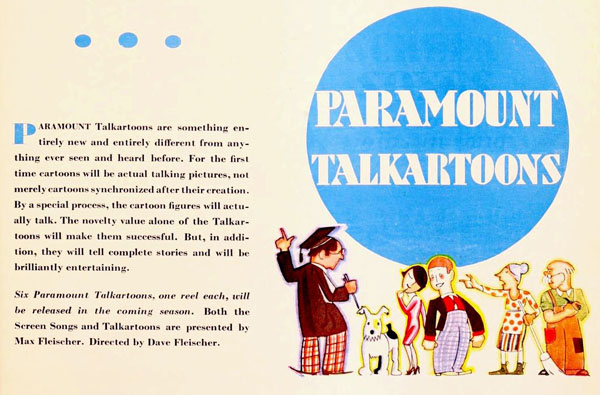Isn’t it interesting that, when you do a long series like this (or some of the other series seen on this site), there comes a time when you come up with information you didn’t have when you wrote the original post. Extreme cases present themselves, when a cartoon you had to skip over because it was unavailable suddenly gets found.

A Paramount trade advertisement from 1929
Two of the early Talkartoons, both starring Bimbo, have shown up recently on the web. They are no longer question marks. This post will thus take care of these and a third leftover cartoon, then begin the revived Screen Song series which began in late 1947. The main differences between the new Screen Songs and the old ones were that they feature anonymous vocals by a group of choristers, not raiding the ranks of radio or night club performers, nor include cur-aways to live-action performances. And, the series is now in all color.
Accordion Joe (Talkartoon, 9/12/30) – Bimbo has taken up box-squeezing, as well as learned to fly – sort of. His plane crashes on a desert of the Southwest, where he meets an Indian princess (a proto-Betty Boop), but they are attacked by savages, and tied together to a single stake. As the savages dance around, Bimbo squeezes his accordion, and starts calming the warriors’ fury, transforming it into music appreciation. Bimbo and proto-Betty make their eventual getaway, riding the accordion like a steed. Watch it here. Songs: “Accordion Joe”, recorded in the spring of 1930 in two recordings, both featuring the same accordionist. Brunswick had a version by “The Jungle Band” (their regular pseudonym for Duke Ellington), with box-squeezer Cornell Smelser, and guest vocalist Dick Robertson. Smelser also appeared as the nominal director of a session entitled “Cornell and his Orchestra” on Okeh, with vocal by Artie Dunn (who would later accompany the accordion sound of the Three Suns). There also appears to be an original song, “U love You and You Love Me”, sung by Bimbo and Betty, of which I know of no commercial recording.
Ace of Spades (Talkartoon, 1/6/31) – Bimbo is a card manipulator, planning to join a high-stakes poker game and raise enough money to go down South. He stops at a pool hall/poker club, but the security man doesn’t want to let him in. (One wonders if the security suggests it is also a speak easy.) Bimbo knocks the door down and is permitted to pass. He seems to be winning every pot, not necessarily through entirely honest means. (Every player has a minimum of three or four Kings, and Bimbo beats all with about seven aces.) The cartoon ends with Bimbo heading back South, while his competition are left cleaned out and wearing barrels for their wardrobe. However, the conveyance Bimbo boards for the trip is a disguised paddy wagon, transporting him directly to Jail. (Do not pass Go. Do not collect $200.). Watch the cartoon here. Songs: “I’m Goin’ Back South”, which may be an original number, of which I know of no commercial recording. “All God’s Children Got Shoes”, also known as “Shout All Over God’s Heaven”. was recorded by the Fisk Jubilee Singers on Victor acoustically (embed below), then electrically for Columbia. The Hall Johnson Choir recorded a Victor version around 1930. Subsequent to this cartoon, it was recorded by both The Charioteers (possibly on Brunswick, repressed by Columbia), and by Paul Robeson (possibly an early electric Victor). Another spiritual, “Do You Call That Religion?” was recorded for Victor in 1927 by the Utica Jubilee Singers. The Monroe Brothers later cut a version for Victor’s Bluebird label. “Push Them Clouds Away”, a mock-spiritual written in Tin Pan Alley, was recorded most notably by Harry C. Browne on Columbia, acoustically in 1917 and electrically in 1928 (recorded at exceptionally slow RPM in arrears of 78). There is a number which seems to be called “Fare You Well, Fare You Well”, at the closing of the film, whose history I cannot ascertain. There is also a melody plated over the first scenes of the film which sounds something like a rag for concert band, which I also do not recognize.
Old MacDonald Had a Farm (Noveltoon, 12/28/45) was inadvertently overlooked by me in a previous chapter. Spot gags on the farm, as MacDonald rehearses a barnyard orchestra. It is also another attempt to revive the Screen Songs format, with the famous bouncing ball. Watch the cartoon HERE. Songs: The title song (which I sometimes refer to as “the American Schnitzelbank”) was recorded by the American Quartet with Billy Murray on Victor, and also in an early version by the Sam Patterson Trio on Edison Diamond Disc. The Kidoodlers recorded it twice, first on Vocalion in the late 1930’s, and again on Comet in the 1940’s. Spike Jones gave it the treatment on an RCA Victor release in the mid 1940’s. It was also a recurrent children’s label staple, covered by virtually every company pressing such discs. Other nursery rhyme melodies also appear, including “Brahm’s Lullaby”.
Little Brown Jug (3/10/48) – Spot gags on inebriation, as a jug of mountain dew infiltrates the water supply of a local stream. The title number was recorded by Frank Crumit on Victor in 1929, though the record wasn’t released until 1932. The song itself is believed to date back to about 1868. It shows up in one of the “Corn Likker Still In Georgia” sketches of Gid Tanner and his Skillet Likkers in the late 1920’s for Columbia. Vernon Dalhart recorded it for Romeo, and possibly other related labels, and also additional versions on Diva (sold at W.T. Grant stores) and Crown. Chubby Parker (a WLS artist) recorded it for Silvertone and Gennett in 1927. An anonymous version was released as “Mr. X” on Grey Gull – actually Irving Kaufman. Glenn Miller updated it as a swing gig for Bluebird in 1939 (embed below). Louise Massey and the Westerners recorded a country version in the 30’s for Vocalion. Denver Darling and his Texas Cowboys would try for an update in “The Little Brown Jug Goes Modern” on Decca, performed with a vocal that is pure anti-Axis propaganda. The Rockets would release an R&B version on Aladdin in 1948. Ken Griffin would present it as an organ specialty on Broadcast, Rondo, and Columbia.
Winter Draws On (5/18/48) – Spot gags on birds and their migratory patterns, as they all prepare to go South for the winter. Buzzy the crow makes a cameo appearance for a few lines. The final gag has a statue down South complaining about the “consarned Yankees” who will be landing on him soon. Songs: “Alabamy Bound”, a standard from 1925, widely recorded in its day and afterward. The dancers of the day could turn to Paul Whiteman on Victor, Ace Vrigode and his 14 Virginians on Columbia, Isham Jones on Brunswick, Ben Selvin on Vocalion, Billy Wynne and his Greenwich Village Inn Orchestra on Edison Diamond Disc (embed below), and Fletcher Henderson’s Orchestra featuring Louis Armstrong on Banner, Domino, Regal, etc. Those who wanted a vocal version could seek the American Quartet on Victor, Blossom Seeley on Columbia, Charlie Wellman (the self-styled Prince of Pop) on Brunswick, or Cliff Edwards (Ukelele Ike) on Perfect and Pathe. Later versions include Les Paul and Mary Ford on Capitol, and the Mulcays on Cardinal.
Sing Or Swim (6/16/48) – Spot gags on and around the beach. It repeats the whiskered-old gag from Betty Boop’s Life Guard about a wave sweeping everyone off the shore, then the next wave depositing them all back where they’ve been. Song: “By the Beautiful Sea”, recorded back in 1914 by Billy Murray and the Heidelberg Quintette for Victor, Ada Joes and Billy Watkins on Columbia, and revived in the year of the cartoon by Spike Jones on RCA Victor, in a version the company withdrew soon after issue, over cocern regarding the line “Over and under and then up…”. It was the original flip side of the best-selling “William Tell Overture”.
Camptown Races (7/30/48) – This may be the first of the Screen Songs to use a mixed chorus to sing the theme song, as opposed to an all-male group of choristers which had provided the lyric for previous episodes. The tune would from here on also open with a single vibraphone note, rather than a brass fanfare. Spot gags centered around a minstrel show. This film seems rather late in using the minstrel show setting, although rumor has it that charitable groups in towns of the Southwest were still prone to raising funds with annual amateur minstrel shows. One memorable gag has one of the participants plating a glass xylophone consisting of milk bottles. One bottle keeps producing a note out of key. No wonder – it is full of “sour” cream (wouldn’t you know?) Songs: “Camptown Races”, originally published as “Gwine to Run All Night”, published in 1850 by Stephen Foster. Widely popular in its day, the song spawned numerous parodies as well as faithful versions. By the time popular recording came along, it was already an old chestnut, so doesn’t seem to have received a great deal of waxing for the adult labels. The most notable exception was a version by Billy Murray on Victor in 1911. The same label would release a version by Wendell Hall in 1924, released under the “Gwine to Run All Night” title. Nat Shilkret and the Victor Salon Orchestra included it in a multi-side Foster Medley on Red Seal Victrola. Richard Crooks issued a Victor Red Seal version in the late 1930’s. Bing Crosby and the Merry Macs issued a version on Decca in the early 1940’s. Bing Crosby sang it in Ridin High (1950), embed below. An updated version was issued by Johnny Mercer and the Pied Pipers in the later 1940’s for Capitol. Sammy Kaye issued a version in a Victor album set in the 1940’s.
The Lone Star State (8/26/48) – Spot gags primarily about Texas, as might be delivered by a native Texan – full of braggadocio about what makes Texas Texas. The gags bring up agriculture, mineral wells, education, sports, and trick shooting, among other things. Songs: “Deep In the Heart of Texas” – and brother, did it ever get recorded a lot. Bing Crosby, accompanied by Woody Herman and his Woodchoppers, took some of the early action on Decca, shortly after the song’s publication. Decca also issued versions by the Merry Macs, and by Ted Weems Orchestra with Vocal by Perry Como. The ultimate top seller went to Alvino Rey on Bluebird (embed below). Tommy Tucker Time on Okeh, and Gene Autry on the same label, provided cover versions. Columbia gave it to Horace Heidt and his Musical Knights. Albert Ammons issued “Deep In the Heart of Texas Boogie” on Mercury. The Ferko String Band performed it instrumentally on Media in a late revival. Duane Eddy issued a single as late as 1962 on RCS Victor, giving the tune his own brand of twang.
Next Post: Noveltoons.


 James Parten has overcome a congenital visual disability to be acknowledged as an expert on the early history of recorded sound. He has a Broadcasting Certificate (Radio Option) from Los Angeles Valley College, class of 1999. He has also been a fan of animated cartoons since childhood.
James Parten has overcome a congenital visual disability to be acknowledged as an expert on the early history of recorded sound. He has a Broadcasting Certificate (Radio Option) from Los Angeles Valley College, class of 1999. He has also been a fan of animated cartoons since childhood.












































The ballad sung between Betty and Bimbo in Accordion Joe is “Silverheels”, a 1905 Native American “intermezzo” by Neil Moret. Moret also wrote the more famous “Hiawatha (A Summer Idyl)” four years earlier. Also, the song sung at the end of Ace of Spades is another old spiritual, “In That Great Gettin’ Up Morning”.
While the soundtrack for “Accordion Joe” does feature the titular instrument, the one Bimbo is actually playing on screen is more properly a “concertina”.
“Old MacDonald” is the “American Schnitzelbank”? But “Die Schnitzelbank” is an American song, devised by German immigrants to help teach the language of the old country to their children. It’s unknown in Germany. Be that as it may, the version of “Old MacDonald” that I remember most fondly is the multilingual one led by Fred Flintstone at the international Boy Scout jamboree in Shangri-La-De-Da Valley. Hanna-Barbera fans might also recall that “Camptown Races” was Officer Dibble’s signature tune when Top Cat was managing his singing career.
The melody of the Betty/Bimbo duet “I Love You and You Love Me” is very similar to that of “Me, Big Chief Ugh-Amugh-Ugh gotta have um squaw”, though the two songs are very different harmonically. I’m very happy to have the chance to see “Accordion Joe” at long last. Betty looks very fetching in pigtails and buckskin.
Bimbo has GOT to be saved. Keep him in the pop culture legacy for the ages. Nowadays the merchandisers try to remake the classic characters into potheads and weed advocates, good thing if it is decriminalized but still feels like stooping pretty low. Whatever happened to just letting things be as they are. Bimbo became obscure for a reason, we still love him here though. I remember them on TV when I was little. Definitely paid more attention to Betty. And all the Fleischer toons are getting the lost-and-found runaround & restoration treatment now. You look at how large that library is, and the cost is easily in the millions. Someone must be paying dearly!!! Just give me the toons, warts and all, there are more important things to spend that much money on. But what do I know, I’m just an OK Boomer. Grew up with the best cartoons though, can’t take that away from me.!!
Universal Studios had Bimbo plushes (and Betty Boops) at their tourist park the last time I went there in 2016.
Maybe so but that is before Bimbo was getting “saved” now. The merch man who makes the pins and shirts wants to bring Koko back in total pothead form. I have nothing against POT but it seems pretty piss-poor to dumb it down and make it all revolve around the pot. Maybe Koko and Bimbo should go to the 12 step groups now with what they are being put through!!! I lived through the 60s and yeah I get it but the marketing now doesn’t have to be appealing to Berkeley grads in the 60s. Oy gevalt !!
What are you talking about?! When was Bimbo a Weedhead?
A few months ago I schlepped from way out on the island to see a big presentation at the New York Comic Con, they had a big panel on the old Fleischer cartoons. Lost but restored. It was with some of the cartoon usuals like Thad K. And his friend Ray Pointer, but they also invited an extra special guest, “Papa Max” groovy granddaughter Jayne.
There was a business partner there, a young man making collectible shirts and underwear and pins. That stuff has all the old cartoon characters on em. So I was intrigued because I’ve been into the Flescher cartoons ever since the 50s-60s when they were on TV. So I know all about them. This shirt-business guy was saying some things that I didn’t understand (Valley boy type speak) so later what I did was to put in the information into Google. I saw all these Fleischer Studios products, brand new, with Betty Koko and Bimbo. And with the social media accounts with the studio, half of the posts are short old cartoon characters smoking weed!! I smoked some of the grass in the 70s but I was becoming an adult, time to wisen up and get with the program, I moved on with my life. I get it, they decriminalized the pot now but some people make their whole life revolve around it!!! That is one thing I didn’t foresee, the Flescher Studios turning their old classic characters into junkies just to try and make a buck. Make them “cool.” THEY WERE ALREADY COOL!! On goods that are made by poor people in China for pennies and will clutter the landfills one day!! Like those Funkin Pops they are dumping now by the dumpster full. I bet the stuff makes pollutants too from the factories. But they don’t say all that when trying to sell the cool Koko and Bimbo “swag” to the stoners. I am not making this up, just look at the social media!!! “Hey Grampy, how about some Sativa??” From “Betty Boop and Grampy Smoke” LOL’!!!!!
I love the toons make no mistake about it but it’s funny how things get handled when the creators are long dead and gone. May their memories be a blessing to us Cartoon fans one and all. Even the sober ones!!!!!
-R”B”Kest.
Bimbo starred in some of the trippiest, freakiest cartoons ever made (e.g., “Swing You Sinners!”, “Bimbo’s Initiation”, “Is My Palm Read”, “Betty Boop, M.D.”, “Crazy Town”). Therefore I don’t think it’s at all surprising that he should be embraced by the stoner community today. Another reader on this site once commented that head shops were full of Deputy Dawg merchandise back in the 1970s; but if that’s true, I can’t think of any possible explanation for it.
I’m old enough to recall “head shops” in the late 1960s, early 70s – and now that you mention it, I have a faint memory of Deputy Dawg bootleg images on rolling papers and the like. If I had to theorize why Deputy Dawg was used, I’d suppose it had to do with ridiculing authority figures – cops in particular; “the fuzz” – and DD was the dumbest of the lot (Quick Draw McGraw and Officer Dibble were crime fighting geniuses by comparison).
I remember Cabarga mentioning the phrase “What were those Fleischers smoking?”